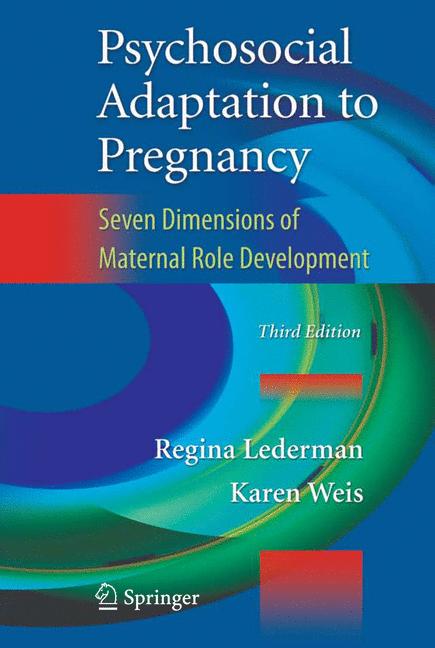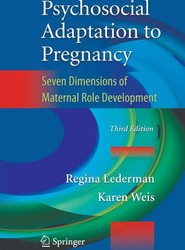(To see other currencies, click on price)
MORE ABOUT THIS BOOK
Main description:
presented in the Introduction (Chapter 1). The focus of Chapter 1 is twofold: (1) to present the research foundations for the psychophysiological correlates of prenatal psychosocial adaptation and the seven prenatal personality dimensions with progress in labor and birth outcomes, and particularly (2) to present the theory underlying the seven dimensions of prenatal psychosocial adaptation, which are further analyzed in the following seven chapters. Chapters 2–8 present a content analysis of the interview responses to the seven significant prenatal personality dimensions that are predictive of pregnancy adap- tion, progress in labor, birth outcomes, and postpartum maternal psychosocial adaptation, and they include: (1) Acceptance of Pregnancy, (2) Identification with a Motherhood Role, (3) Relationship with Mother, (4) Relationship with Husband, (5) Preparation for Labor, (6) (Prenatal) Fear of Pain, Helplessness, and Loss of Control in Labor, and (7) (Prenatal) Fear of Loss of Self-Esteem in Labor. There is no other comparable comprehensive, in-depth, prenatal personality research or empirical and content analysis of pregnancy-specific dimensions of maternal psychosocial adaptation to pregnancy.
Feature:
A unique analysis maternal psychosocial development during pregnancy through seven dimensions that serve as the foundation for assessment
Utilizes all new psychometric instruments that parallel the responses made by expectant women
Back cover:
Psychosocial Adaptation to Pregnancy: Seven Dimensions of Maternal Role Development
Regina Lederman, University of Texas Medical Branch, Galveston Karen L. Weis, USAF School of Aerospace Medicine, Brooks City-Base TX
The links between a pregnant woman’s physical health and her baby’s subsequent development are widely known. Less well understood are the behavioral and emotional processes that develop during the same nine months. In Psychosocial Adaptation to Pregnancy, seven dimensions of maternal emotional health are identified—including acceptance of the pregnancy, motivation to take on the role of motherhood, relationships with husband/partner and with her own mother, preparation for labor, self-esteem, and sense of control—that have significant impact on delivery, postpartum adaptation, infant health, and early childhood development. Backed by the authors’ original research and interviews, the book provides readers with a first-of-its kind analysis of the role of these core functions throughout pregnancy, as well as practical materials for use with pregnant clients in the form of assessment tools and evidence-based interventions for promoting positive development. It is particularly noteworthy that the Surgeon General of the United States has recommended measurement of prenatal psychosocial and behavioral risk factors to improve the screening of psychosocial risks and responses for purposes of addressing these risk factors.
Key features of the book:
Theoretical framework with rationales for the seven psychosocial dimensions.
How these phenomena may differ between first and later pregnancies.
Assessment instruments with excellent properties, including the Prenatal Self-Evaluation Questionnaire and the Postnatal Self-Evaluation Questionnaire.
Therapeutic and counseling intervention strategies to improve adaptive development in each of the seven psychosocial dimensions.
Findings specific to women in diverse cultural groups, plus a chapter devoted to women in the military and military spouses.
Discussion of salient issues of pregnancy, including physical changes, body image, intimacy, trust, and ambivalence.
Psychosocial Adaptation to Pregnancy is a significant addition to the psychosocial assessment literature, a needed resource for clinical and health psychologists, clinical social workers, marriage and family therapists, professional counselors, and obstetrical nurses. It is also adaptable to undergraduate and graduate courses in maternal reproductive health and obstetrical nursing. The course can be taught as an assessment and intervention workshop, and as a continuing education course throughout the U. S.
Contents:
Introduction.- Acceptance of Pregnancy.- Identification with a Motherhood Role.- Relationship with Mother.- Relationship with Husband.- Preparation for Labor.- Prenatal Fear of Pain, Helplessness, And Loss of Control in Labor.- Prenatal Fear of Self-Esteem in Labor.- Prenatal and Postnatal Psychosocial Adaptation in Military Women.- Prenatal Adaptation among Multigravidas.- Quantitative and Qualitative Results.- Methods of Assessment: Psychosocial Adapatation to Pregnancy Questionnaire Scales and Interview Schedules, and Review of Interventions to Enhance Adaptation.
PRODUCT DETAILS
Publisher: Springer (Springer New York)
Publication date: September, 2009
Pages: 340
Weight: 1450g
Availability: Not available (reason unspecified)
Subcategories: Obstetrics and Gynaecology, Psychology, Psychotherapy, Public Health
Publisher recommends
CUSTOMER REVIEWS
From the reviews of the third edition: “This book, which describes seven specific dimensions of maternal emotional health during pregnancy, is based on the authors’ research into psychosocial risk factors and potential interventions. … The audience … includes Lamaze and other prenatal educators, as well as psychiatrists, psychologists, social workers, marriage and family therapists, professional counselors, the general public, and pregnant women. … This is an excellent book. … Anyone who conducts clinical activities with women of childbearing age will find this book informative.” (Gary B. Kaniuk, Doody’s Review Service, March, 2010)


